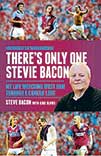 My life watching
West Ham through
a camera lens
My life watching
West Ham through
a camera lens
by Steve Bacon & Kirk Blows
Biteback, £15.99
Reviewed by Neil Fairchild
From WSC 310 December 2012
When Steve Bacon was appointed West Ham club photographer in 1980, John Lyall was only the fifth West Ham manager of the 20th century. In the 23 years since Lyall’s departure, there have been nine different permanent managers and almost as many promotions and relegations. For Hammers fans the familiar rotund figure of Bacon waddling across the pitch on matchdays has become a reassuring constant in an uncertain world.
Until Alan Pardew arrived in 2003 Bacon would travel to away matches on the team coach. He would even be present in the dressing room during team talks. There’s Only One Stevie Bacon is a behind-the-scenes glimpse at the dysfunctional world of West Ham over three decades, with a chapter dedicated to the tenure of each manager from Lyall to Gianfranco Zola.
Although Bacon’s subjectivity gives the book a partial and at times spiteful feel – Paul Kitson is a “weasel”, Brian Kidd a “horrible little shit” – his refusal to pander to fans’ preconceptions makes for a refreshing viewpoint. Ron Greenwood is an “awkward bugger” and Pardew, who was the last manager to have his name sung by West Ham fans, is repeatedly dismissed as arrogant and mocked for his use of psychology and motivational techniques. Lou Macari, loved by neither fans nor players, is portrayed in a surprisingly compassionate light. Others are depicted in exactly the way you would expect: old-fashioned Billy Bonds, for example, struggles with the modern world. Following rumours about the close relationship between Ian Bishop and Trevor Morley, Bonds calls both players into his office and asks: “Well, are you or ain’t you?” It turns out they ain’t.
Kirk Blows, author of various books on West Ham, has been enlisted to bring a sense of cohesion to these anecdotes. Blows appears to have viewed his role as that of articulating Bacon’s thoughts rather than challenging them. At times some editing would have been kind. Bacon’s bafflement at the poor quality of televisions in a department store in 1980s communist Romania (“the arsehole of the universe” as he charmingly calls it) would have been a useful omission.
Bacon is the first to admit that he is no football expert and this book sheds little light on why the FA Cup that was won just before his arrival was the club’s last piece of major silverware. Nevertheless there are plenty of interesting and funny tales: the team coach stopping on the way to a match at Stoke to allow the kit manager to put a bet on for Macari; a naked John Moncur jumping out of a locker during one of Harry Redknapp’s team talks; a frightened Paolo di Canio telling a stewardess “I don’t want to die” before getting off a plane that is about to take off.
Far too often the tone of the book is brought down by stories that would be better left in the pub. His fondness of Mark Ward’s wife’s “big boobs” and a players’ masturbation competition on the team coach (yes, really) are two examples. Then again, given the niche target market for this book, perhaps Bacon simply has a good understanding of his audience.